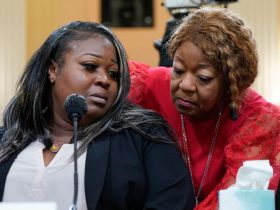Not a worthy business partner. “Unfit” for the White House. “Con artist.”
These are not the words of Democrats attacking Donald Trump, but comments from three Republicans Trump has considered to be his running mate. Sens. J.D. Vance (R-Ohio) and Marco Rubio (R-Fla.), who have been at the center of discussions inside the Trump campaign, and North Dakota Gov. Doug Burgum (R), who is also in the mix, have been lavishing Trump with praise in recent weeks as they jockey for position.
But that was not always the case.
Previously, they have attacked Trump’s character or policies, and spoken in stark and sometimes personal terms about him. As Trump closes in on an announcement, the finalists reflect a larger shift in the party among scores of ambitious Republicans since 2016. Recognizing Trump’s enduring dominance, many have rallied to his corner, including prominent ex-critics.
Some observers regard their moves as a cynical ploy to help them climb the political ladder, while others have dismissed them as less meaningful bygones.
“It would be very hard to find a leading Republican who had not taken that journey to be honest,” said former congressman David Jolly, a Trump critic who left the GOP. “That doesn’t allow them to escape some criticism, because it is clear in those moments, and now for his potential VP picks, they are answering to their political compass, not to their political convictions.”
Trump has a habit of welcoming former foes who come around to showing fealty to him, and his allies and advisers brushed away the old jabs as typical politicking. Sen. Lindsey Graham (R-S.C.), a political opponent turned ally to Trump, shrugged off concerns about potential running mates’ critiques as he argued that Trump should focus on a pick that can help expand the map.
“In politics, people go at each other,” Graham said. “That’s the way politics is sport of its own.”
Trump campaign spokesman Jason Miller compared the rebukes to a heated moment between President Biden and Vice President Harris, when they were both vying for the Democratic nomination in 2020. In the second debate, Harris pointed out that Biden had spoken fondly of his relationships with segregationist senators and opposed aspects of mandatory busing to end school desegregation, although she prefaced the attack with the caveat that she wasn’t accusing Biden of racism.
“By comparison, President Trump and any of his prospective VP picks will be much more simpatico,” said Miller.
Trump’s allies also highlight that the potential vice-presidential candidates have proved their loyalty, defending Trump on television and the campaign trail, as well as fundraising for him. Some are viewed as potential administration officials even if they are not Trump’s running mate. Yet, their previous comments could be a liability exploited by Democrats who have signaled a strategy to emphasize the prospective running mates’ willingness to defer to Trump’s demands and agenda.
Vance made some of his most forceful attacks on Trump during media interviews promoting his successful 2016 memoir “Hillbilly Elegy.” Vance called himself “a Never Trump guy” and said he didn’t vote for him in 2016. In an August 2016 New York Times op-ed headlined, “Why Trump’s Antiwar Message Resonates with White America,” Vance wrote, “Mr. Trump is unfit for our nation’s highest office.”
“There is definitely an element of Donald Trump’s support that has its basis in racism or xenophobia,” he told PBS’s Judy Woodruff in September 2016, when asked about Hillary Clinton’s comment that as many as half of Trump’s supporters belonged to a “basket of deplorables.” He added, “But a lot of these folks are just really hard-working people who are struggling in really important ways.”
Vance also sent a message that year to his law school roommate, Josh McLaurin, that McLaurin has recounted publicly. In it, Vance said he went “back and forth between thinking Trump is a cynical asshole like Nixon who wouldn’t be that bad (and might even prove useful) or that he’s America’s Hitler,” according to a screenshot McLaurin shared on social media in 2022 when Vance was running for Senate in Ohio.
McLaurin, now a Democratic Georgia state senator, warned in an interview that Vance might be Trump’s “most dangerous” pick as someone who would double down on Trump’s vitriol and retribution. He cited Vance’s ability to identify and connect with the anger felt by the MAGA base and how he wielded that skill to get elected and campaign for Trump.
Compared with Trump’s first-term vice president Mike Pence, who helped certify Biden’s 2020 election win despite Trump’s efforts to overturn the election, he said Vance would probably inflame partisanship and contempt for the other side.
“There is an anger he wants to vindicate that he’s carrying around,” McLaurin said.
Vance has previously said that his prior critical comments about Trump no longer represent his view of Trump, and his Senate campaign at the time dismissed the message to McLaurin as old news.
Vance won Trump’s endorsement for the Senate in 2022, which proved decisive in his primary, and he befriended Trump’s son, Donald Trump Jr. He said he had come around on Trump’s populist appeals and thought he was an effective president. He has since become a vocal Trump campaign surrogate, appearing with Trump outside the New York courthouse where Trump was convicted of a scheme to illegally influence the 2016 election; and helped organize a fundraiser with tech entrepreneur David Sacks.
“Like a lot of other elite conservatives and elite liberals, I allowed myself to focus so much on the stylistic element of Trump that I completely ignored the way in which he substantively was offering something very different on foreign policy, on trade, on immigration,” Vance told the New York Times’s Ross Douthat last month, adding that he voted for Trump in 2020.
Donald Trump Jr. defended his friend’s previous remarks in a statement, saying articles about Vance’s critiques were already written and it’s “embarrassing that news outlets continue to regurgitate them like they’re breaking news.”
“Trust me, we have all discussed it with him at length and not only are we long past all of this, but we’re 100% confident that JD is America First to the core,” the younger Trump said in the statement. “Objectively speaking, no one in the Senate has been a stronger supporter of my father than he has been.”
Similarly, Rubio has become one of Trump’s most vocal supporters in the Senate after leveling personal attacks on Trump in 2016 over Trump’s business dealings, among other things. Before he dropped out of that race and endorsed Trump, Rubio called Trump a “con artist” who would fracture the GOP.
At one point, Rubio questioned if Trump, then turning 70 months before the election, was up to the task given his age, a concern that has become more significant for some voters.
“He would be the oldest president ever elected. And it’s like an eight-year term, so you start to worry,” Rubio said of Trump in 2016.
Trump did not hold back with his own criticism of Rubio in 2016, who he frequently called “Little Marco,” and derided him as “a disaster for Florida” and who “couldn’t get elected dogcatcher.”
Rubio later disavowed his disses and fell in line behind Trump in the general election. He helped shape the Trump administration’s Latin America policies and has also been a surrogate for Trump with Latino voters and in Florida.
“He became president, we worked together on many things that were important to the country, important to me,” Rubio said in an interview with The Washington Post. “It was a very good working relationship. I didn’t know him when I ran in 2016, didn’t know him as a person.”
Of the three, Burgum has publicly assailed Trump the least, mostly avoiding speaking about Trump during his brief stint in this cycle’s Republican primary. (He endorsed Trump on the eve of the Iowa caucuses.) However, Burgum, a tech entrepreneur, said last July that he would not do business with Trump.
“I just think that it’s important that you’re judged by the company you keep,” he told NBC’s Chuck Todd.
Asked about that answer, Burgum said in a Fox News interview in May that he did not know Trump personally when he was a governor but that he has become closer to Trump since he has been on the campaign trail for him.
“I’ve had a chance to see him, meet the real person, understand what he’s like versus how the press portrays him,” Burgum said. “I’m telling you, I’ve known CEOs my whole life. There isn’t a CEO in America who works harder than this guy.”








